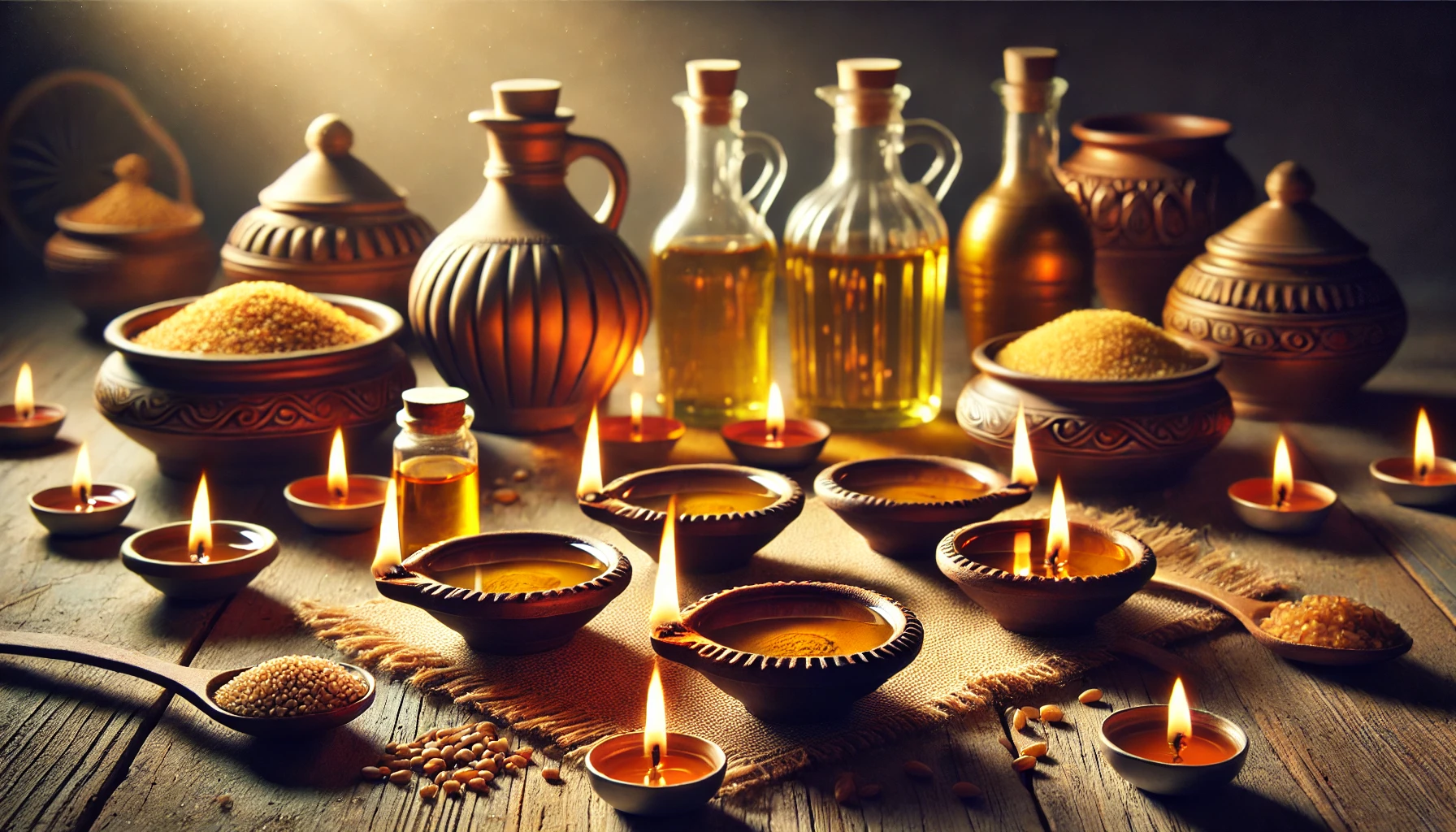- You have no items in your shopping cart
- Subtotal: ₹0.00

Which Oil is Best for Diwali Diyas Lamps and Why?
Which Oil is Best for Diwali Diyas? Lighting diyas (lamps) during Diwali is one of the most sacred traditions in Indian culture. These diyas symbolize the victory of light over darkness and knowledge over ignorance. Choosing the right oil to light your diya is not only a matter of tradition but also plays a crucial role in the purity of the light, the ambiance it creates, and the positive energy it generates.
Various oils are used for lighting diyas, each having its own cultural significance, benefits, and properties. In this article, we will explore the most commonly used oils for lighting Diwali diyas and why they are considered the best options.
1. Cow Ghee (Clarified Butter)
Cow ghee is regarded as the purest and most sacred oil for lighting diyas, especially during religious festivals like Diwali. It has been used in Hindu rituals for centuries and is considered to have a high sattvik (pure) quality, which attracts divine energy.
Benefits:
- Spiritual Purity: Cow ghee has a high spiritual significance. Lighting a lamp with cow ghee is believed to invite the blessings of Goddess Lakshmi, the goddess of wealth and prosperity.
- Bright Flame: Ghee lamps produce a bright, steady flame that symbolizes wisdom and knowledge.
- Positive Energy: The light from a ghee diya is said to dispel negativity and bring peace and harmony into the home.
Usage: Traditionally, ghee lamps are lit in front of deities during puja and in the evening to ward off evil spirits. It is considered auspicious to light ghee diyas during Lakshmi puja on Diwali night.
2. Sesame Oil (Til Oil)
Sesame oil, also known as til oil, is another widely used oil for lighting diyas, especially in South Indian traditions. It is believed that sesame oil can cleanse negative energies and promote mental clarity.
Benefits:
- Attracts Positive Energy: Lighting a diya with sesame oil during Diwali helps in attracting sattvik vibrations, promoting an aura of calmness and spirituality in the home.
- Health Benefits: Apart from its spiritual importance, sesame oil has health benefits such as reducing stress and anxiety, which can positively affect the atmosphere during celebrations.
- Long-Lasting Flame: Diyas lit with sesame oil burn longer, making it a preferred choice for rituals that require the diya to stay lit for extended periods.
Usage: Sesame oil diyas are typically used during evening prayers, and they are also recommended for lighting in temples and homes to invite prosperity and good health.
3. Mustard Oil
Mustard oil is commonly used in Northern India for lighting diyas during Diwali. It is widely available and affordable, making it a popular choice for daily prayers and rituals.
Benefits:
- Warding Off Evil: Mustard oil is believed to have properties that help ward off negative energies and evil spirits. In Vastu, it is said to bring positivity and prevent misfortune.
- Strong Aroma: The pungent aroma of mustard oil is also believed to keep insects and pests away, making it ideal for outdoor diya lighting during Diwali.
- Steady Flame: Mustard oil provides a steady flame, making it suitable for use in areas prone to wind or draft.
Usage: Mustard oil is traditionally used for lighting diyas in temples and homes, particularly in the early morning or during evening prayers.
4. Coconut Oil
Coconut oil is a popular choice for lighting diyas in South India, particularly in Kerala. It is considered an oil that brings purity, protection, and prosperity.
Benefits:
- Purity and Protection: Coconut oil is believed to provide protection against negative energies and promote mental clarity. It is commonly used during religious festivals and temple rituals.
- Mild Aroma: Unlike mustard oil, coconut oil has a mild and pleasant aroma, making it ideal for indoor use where strong scents may be less desirable.
- Balanced Flame: Coconut oil provides a stable flame, creating a calm and serene atmosphere during prayers.
Usage: Coconut oil diyas are often used in temples and homes for daily prayers. They are especially popular during Diwali and other South Indian festivals.
5. Castor Oil
Castor oil is sometimes used as a base oil mixed with other oils like ghee or sesame oil. It is known for producing a bright, steady flame that burns for long periods.
Benefits:
- Bright Flame: Castor oil is often used in conjunction with other oils to enhance the brightness and longevity of the flame.
- Symbolism: Lighting a lamp with castor oil is believed to invite prosperity and ensure a peaceful household.
Usage: Castor oil is often blended with other oils to enhance the performance of the diya, and it is used during pujas, particularly for special occasions.
6. Mahua Oil (Ippa Oil)
Mahua oil, also known as Ippa Oil, is less commonly used but has significant cultural importance, especially in tribal communities and some parts of India. It is said to bring unique spiritual benefits and is believed to attract divine blessings.
Benefits:
- Cultural Significance: Lighting diyas with mahua oil is believed to bring prosperity and blessings from the gods, particularly in rural and tribal areas.
- Environmental Harmony: It is considered to have natural purifying properties, balancing the environment’s energy.
Usage: Mahua oil is typically used in remote regions and during special religious events, particularly where traditional oils are favored over commercial ones.
Conclusion: Which Oil is Best for Diwali Diyas?
The best oil for Diwali diyas ultimately depends on the cultural preferences, spiritual beliefs, and availability in your region. However, cow ghee is considered the most sacred and is often the first choice for those seeking purity and divine blessings during Diwali. For those who prefer longer-lasting flames or more affordable options, sesame oil and mustard oil are excellent alternatives.
Whatever oil you choose, lighting a diya is a spiritual act that symbolizes the removal of darkness and ignorance, inviting light, wisdom, and prosperity into your life.



